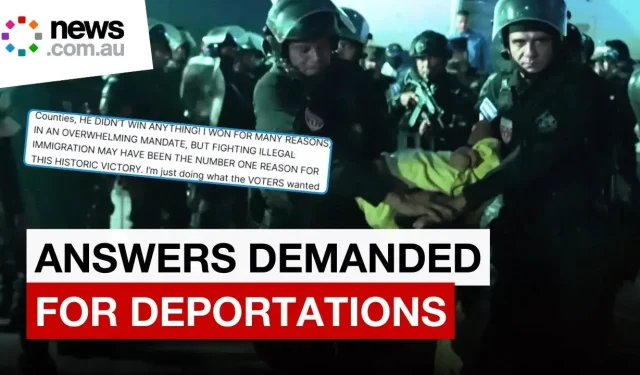Judge’s Demand for Clarification
U.S. District Judge James Boasberg has issued a demand for detailed explanations from the Trump administration regarding deportation flights that occurred over the weekend. These flights took off in direct defiance of the judge’s temporary injunction aimed at halting deportations under a historical 18th-century law. This unprecedented legal challenge raises significant questions about the enforcement of immigration laws and the judicial process in America.
Background of the 18th-Century Law
The 18th-century law, invoked in this legal controversy, has been a focal point for immigration policy. It reflects a historical precedent that now intersects with contemporary debates on human rights and immigration control. The judge’s action, aimed at suppressing these deportations, underscores growing concerns about the ethical implications of government actions against individuals—often families—facing removal.
Response from the Trump Administration
The administration’s decision to proceed with deportation flights despite the ruling has prompted fierce criticism from legal experts and human rights advocates. This defiance can be perceived as a challenge to judicial authority and raises questions about the executive branch’s commitment to abide by court orders. The unfolding scenario may have broader implications for future judicial rulings and the interplay between federal agencies.
Presidential Remarks and Supreme Court Reaction
In a notable turn of events, President Trump has called for the impeachment of Judge Boasberg over his ruling, a statement that prompted a rare rebuke from Chief Justice John Roberts of the U.S. Supreme Court. This exchange highlights the tension between branches of government and the extent to which the judiciary influences executive actions. The Chief Justice’s retort emphasizes the importance of judicial independence and the potential dangers of political interference in legal matters.
Potential Consequences for Immigration Policy
The ongoing situation may affect immigration policies significantly. Should the judge’s ruling hold in subsequent legal reviews, it may establish a precedent limiting the administration’s ability to enact aggressive deportation measures. Conversely, if the administration’s stance prevails, it could embolden similar actions across various states, reflecting a more stringent approach to immigration enforcement. The divided opinion among the public and policymakers indicates that this issue will likely remain contentious.
Public Opinion and Political Ramifications
Public response to the deportation flights and the President’s remarks has been polarized. Advocacy groups are rallying for a more humane approach towards immigrants, calling for systemic reform to protect vulnerable populations. Meanwhile, supporters of the immigration policies argue that strong enforcement is necessary for national security. As these debates unfold, we can expect to see more vigorous political campaigning shaping not just immigration policies, but also the broader political landscape ahead of upcoming elections.


